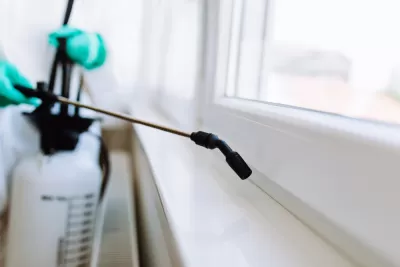For children who have asthma, pests like cockroaches and mice can trigger allergic reactions and lead to recurring and expensive hospital visits. Could insurers save money by investing in housing-based improvements like pest management services?

There’s a connection between one’s home environment and asthma. An array of home-related factors can trigger or worsen asthma: pests such as cockroaches and mice can cause allergic reactions, and secondhand smoke, air pollution, and mold can make it worse. In New York City, children with asthma who are exposed to pests are three times more likely to be hospitalized, and they account for more than two-thirds of asthma-related rehospitalizations annually, according to the city’s Department of Health and Mental Hygiene (DOHMH).
The department recently launched a pilot project to zero in on pest-related pediatric asthma by delivering comprehensive pest management to patients’ homes—and tapping a group of Medicaid health insurers to fund it, even though such nonmedical interventions aren’t typically covered. If the three-year Medicaid Together Improving Asthma Program pilot succeeds in reducing repeat hospitalizations, the insurers should reap returns in the form of direct health care cost savings—but if not, a $1.2 million fund is in place to mitigate any losses.
“The environment in which a person lives directly affects their health,” says DOHMH project manager Beatrice Mauger, launch lead for Medicaid Together. “Our hope is to have a win-win for the health care sector and their clients. That can be achieved if this model shows the health care sector that investing in housing-based improvements can generate sustainable financial benefits.”
Over the years, other programs have worked more generally to tackle home health hazards that could exacerbate asthma, such as the U.S. Department of Housing and Urban Development’s Healthy Homes Program and the National Institute of Food and Agriculture’s Healthy Homes Partnership. At Boston Medical Center...
FULL STORY: Getting Medicaid to Pay for Pest Control

Maui's Vacation Rental Debate Turns Ugly
Verbal attacks, misinformation campaigns and fistfights plague a high-stakes debate to convert thousands of vacation rentals into long-term housing.

Planetizen Federal Action Tracker
A weekly monitor of how Trump’s orders and actions are impacting planners and planning in America.

In Urban Planning, AI Prompting Could be the New Design Thinking
Creativity has long been key to great urban design. What if we see AI as our new creative partner?

King County Supportive Housing Program Offers Hope for Unhoused Residents
The county is taking a ‘Housing First’ approach that prioritizes getting people into housing, then offering wraparound supportive services.

Researchers Use AI to Get Clearer Picture of US Housing
Analysts are using artificial intelligence to supercharge their research by allowing them to comb through data faster. Though these AI tools can be error prone, they save time and housing researchers are optimistic about the future.

Making Shared Micromobility More Inclusive
Cities and shared mobility system operators can do more to include people with disabilities in planning and operations, per a new report.
Urban Design for Planners 1: Software Tools
This six-course series explores essential urban design concepts using open source software and equips planners with the tools they need to participate fully in the urban design process.
Planning for Universal Design
Learn the tools for implementing Universal Design in planning regulations.
planning NEXT
Appalachian Highlands Housing Partners
Mpact (founded as Rail~Volution)
City of Camden Redevelopment Agency
City of Astoria
City of Portland
City of Laramie




























